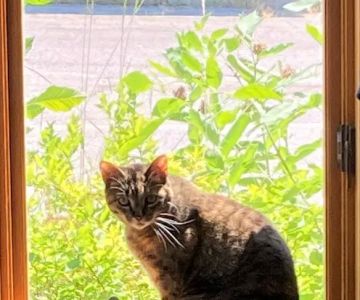Pet Health Check-Ups for Senior Animals in Raleigh: Ensuring Their Comfort and Well-being
- Importance of Pet Health Check-Ups for Senior Animals
- Common Health Issues in Senior Pets
- How Often Should Senior Pets Have Health Check-Ups?
- Choosing the Right Veterinarian for Your Senior Pet
- Benefits of Regular Vet Visits for Senior Pets
1. Importance of Pet Health Check-Ups for Senior Animals
As pets age, their healthcare needs change. Regular health check-ups are crucial to ensure that senior pets remain healthy and comfortable in their later years. Just like humans, pets can develop health issues that are more common with age, and these problems can often be prevented or treated more effectively when caught early. Routine veterinary visits allow for early detection of diseases and conditions that may not be immediately visible to the pet owner.
In Raleigh, pet owners are becoming more aware of the importance of regular vet visits for their aging animals. Senior pets benefit significantly from these check-ups, ensuring they live a longer, healthier life with fewer complications.
2. Common Health Issues in Senior Pets
As pets grow older, they become more susceptible to various health issues. Some common conditions that senior pets face include:
2.1 Arthritis and Joint Pain
Arthritis is a common condition in older pets, causing pain and stiffness in the joints. This can lead to difficulty walking, climbing stairs, or even standing up. Regular check-ups can help a veterinarian monitor your pet’s joint health and provide treatments to alleviate pain.
2.2 Dental Disease
Dental issues such as gum disease and tooth decay can lead to more severe problems like tooth loss or infection. Senior pets, in particular, are more likely to suffer from these issues. Regular dental check-ups allow for early cleaning, preventing potential dental issues that could impact overall health.
2.3 Kidney Disease
Kidney disease is another common issue in senior pets, especially in cats and dogs. Regular blood tests during check-ups can help identify early signs of kidney problems and allow for treatment to slow down the disease progression.
2.4 Cancer
Just like in humans, cancer can develop in senior pets. Although some types of cancer are difficult to detect in early stages, routine exams can help veterinarians spot unusual growths or symptoms that may indicate cancer.
3. How Often Should Senior Pets Have Health Check-Ups?
The frequency of health check-ups for senior pets varies based on their age and overall health. Typically, pets over the age of 7 are considered senior, and they should have a health check-up at least twice a year. This is more frequent than the yearly visits recommended for younger pets, as older pets may experience rapid changes in their health.
Regular check-ups ensure that potential health issues are caught early and that your pet’s quality of life is maintained. Depending on your pet’s health status, your veterinarian may suggest more frequent visits or specific screenings to monitor particular conditions.
4. Choosing the Right Veterinarian for Your Senior Pet
Choosing the right veterinarian is essential to ensuring that your senior pet receives the best care possible. When looking for a vet in Raleigh, consider these important factors:
4.1 Experience with Senior Animals
It’s important to choose a veterinarian who has experience working with senior pets. These veterinarians will be more familiar with the specific health concerns and treatment options for aging animals, and they can provide tailored care for your pet’s needs.
4.2 Comprehensive Care Approach
Look for a vet who takes a comprehensive approach to your pet’s health. They should focus on preventative care, early detection of diseases, and maintaining a high quality of life for your pet. Ask about their approach to senior pet health and whether they offer services like dental care, pain management, and geriatric screenings.
4.3 Communication and Compassion
Your relationship with the veterinarian should be one of trust and open communication. A compassionate vet who listens to your concerns and provides clear explanations of your pet’s condition and treatment options will make the experience much easier for both you and your senior pet.
5. Benefits of Regular Vet Visits for Senior Pets
There are numerous benefits to scheduling regular health check-ups for senior pets, including:
5.1 Early Detection of Health Problems
As mentioned earlier, regular check-ups allow for early detection of health problems, including conditions like arthritis, dental disease, kidney problems, and cancer. Early detection often leads to more effective treatment, helping your pet maintain a high quality of life for longer.
5.2 Improved Pain Management
Senior pets are more likely to experience pain, whether from arthritis, dental issues, or other conditions. Regular vet visits enable your veterinarian to assess your pet’s pain levels and provide appropriate treatments to manage discomfort and improve mobility.
5.3 Tailored Preventative Care
As pets age, their healthcare needs evolve. Regular check-ups allow for tailored preventative care to address these changing needs. Whether it’s vaccinations, dietary recommendations, or joint supplements, a veterinarian will help ensure your pet’s health is managed in the best way possible.
6. Ensure Your Senior Pet’s Health with Regular Check-Ups
Ensuring your senior pet’s health is a crucial part of maintaining their happiness and comfort in their golden years. Regular health check-ups in Raleigh are essential to detecting problems early, providing timely treatment, and improving your pet’s quality of life. For expert care and advice tailored to your senior pet’s needs, visit Hidden Brook Veterinary for more information and to schedule an appointment.











